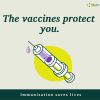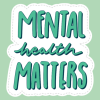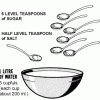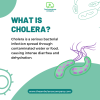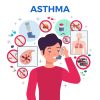Vaccination is the process of administering a vaccine, which contains a weakened or inactivated form of a disease-causing pathogen, to stimulate the body’s immune system to create an immune response. This immune response can help protect the body against future infections caused by the same pathogen. Vaccines work by mimicking the infection caused by the disease-causing pathogen, without causing illness. Immunisation is the process of getting protection against diseases from the vaccines.
According to the World Health Organisation , Vaccines help to reduce the risks of getting a disease by working with the body’s natural defenses to build protection.
Vaccination is animportant public health intervention that iseffective in preventing the spread of many infectious diseases.
Two of the most common diseases that can be prevented through vaccinations are measles and chickenpox.
Why is Vaccination Important?
Vaccination is one of the most effective ways to prevent the spread of infectious diseases. Vaccines have been developed and tested over many years to ensure their safety and effectiveness, and are recommended by healthcare professionals worldwide.
Vaccines also contribute to the protection of the wider community by reducing the spread of infectious diseases. This is known as herd immunity, where a high percentage of the population is vaccinated, making it difficult for the disease to spread.
What is Measles Vaccination?
Measles is a highly contagious viral infection that can lead to other serious complications. Measles can be prevented through vaccination with the measles, mumps, and rubella (MMR) vaccine.
The MMR vaccine is recommended for all children and adults who have not been previously vaccinated or who have not had measles. It is usually given in two doses, the first dose at 12-15 months of age and the second dose at 4-6 years of age. The vaccine is safe and effective, with high protection against measles.
What is Chickenpox Vaccination?
Chickenpox is a highly contagious viral infection that causes a blister-like rash, fever, and itching. It can be especially dangerous for people with weakened immune systems, such as newborns, pregnant women, and people with HIV/AIDS.
Chickenpox can be prevented through vaccination with the varicella vaccine. The vaccine is recommended for all children and adults who have not been previously vaccinated or who have not had chickenpox. It is usually given in two doses, the first dose at 12-15 months of age and the second dose at 4-6 years of age. The vaccine is safe and effective, with a high level of protection against chickenpox.
What are the Common Misconceptions about Vaccines?
There are many myths and misconceptions surrounding vaccines, which usually lead to confusion and even prevent people from getting vaccinated. The idea that vaccines can cause autism, or that vaccines are not necessary because the diseases are no longer prevalent, are some of the common misconceptions.
Why should I get Vaccinated?
Vaccines are helpful in preventing the spread of infectious diseases, including measles and chickenpox.
There are many benefits to vaccination and immunization. Not only do they protect individuals from disease, but they also help to prevent the spread of disease within communities, therefore reducing deaths due to infectious diseases.
By receiving vaccines against diseases such as measles and polio, individuals can help to protect themselves and those around them from these dangerous illnesses.
If you have found this information valuable, please share it with your network
Follow us on Facebook, Instagram, LinkedIn, and Twitter for more health tips.
https://www.who.int/health-topics/vaccines-and-immunization?adgroupsurvey={adgroupsurvey}&gclid=CjwKCAjwuqiiBhBtEiwATgvixE1VVJQvSrVACQcMGQJXCuHO2JaoVxrPXW_JohYDc-wIA-IkJ5pMDRoCng0QAvD_BwE#tab=tab_1
https://www.cdc.gov/vaccines/vpd/varicella/public/index.html
VACCINATION: What is Vaccination and How Does it Work?
Vaccination is the process of administering a vaccine, which contains a weakened or inactivated form of a disease-causing pathogen, to stimulate the body’s immune system to create an immune response. This immune response can help protect the body against future infections caused by the same pathogen. Vaccines work by mimicking the infection caused by the […]
